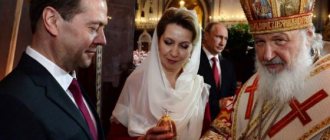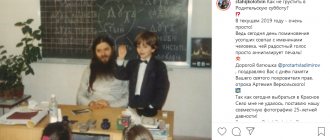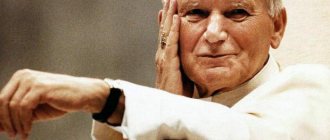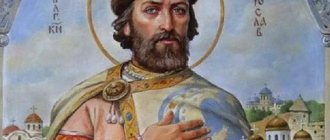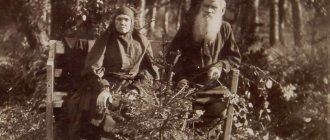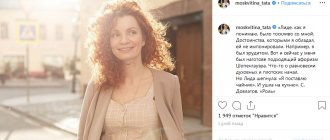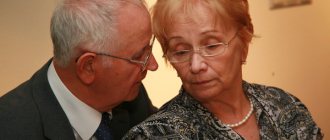There are articles on Wikipedia about other people with the name Rafail and the surname Berestov.
| Hieroschemamonk Raphael | |
| Birth name: | Mikhail Ivanovich Berestov |
| Occupation: | clergyman |
| Place of Birth: | Moscow, RSFSR |
| Father: | Ivan Berestov |
| Mother: | Anna Berestova |
K:Wikipedia:Articles without images (type: not specified)
Hieroschemamonk Raphael
(in the world -
Mikhail Ivanovich Berestov
; November 20, 1932, Moscow, RSFSR USSR) - clergyman of the Russian Orthodox Church, tonsure of the Holy Trinity-Sergius Lavra, well-known critic of ecumenism, INN, anti-globalist, spiritual writer.
Biography
Born on November 20, 1932 in Moscow into a family of non-believers. His brother is Abbot Anatoly (Berestov), a famous pediatric neurologist, Doctor of Medical Sciences, professor, head of the rehabilitation center at the Krutitsky Compound.[1]
After graduating from school, he came to faith, visited the Trinity-Sergius Lavra, where he met a nun who spent 25 years in Stalin’s camps, became disabled there and walked on crutches. Those around her said that she was a seer and a person of great spiritual life. When asked to pray for relatives, the nun said: “Oh, Rafailchik, it’s you!” - “I’m not Raphael, I’m Mikhail!” - “Yes, yes, I know that you are Raphael. I know that your father John will become a believer at the end of his life, just like your mother, Anna. But - rejoice - your brother Anatoly will soon become a very believer! But we need to pray for brother Nikolai.”
So she called all her relatives exactly by name, predicting future events. And so it happened. The third brother Nikolai is the only person in their family who did not come to faith in God.[2]
In 1954, Mikhail entered the brotherhood of the Holy Trinity-Sergius Lavra, where he was one of the fellow believers of Archimandrite Kirill (Pavlov). During the period of Soviet power, he was an active church dissident, speaking out against ecumenism, Latinophilism, Freemasonry, modernism, cooperation between the leadership of the Moscow Patriarchate and the KGB, in connection with which he was subjected to disciplinary sanctions several times by the Lavra administration and in the mid-1970s received the blessing to move to one from secluded Abkhaz hermitages.
While living in the mountains of Abkhazia, he underwent monastic practice under the guidance of Elder Vitaly of Tbilisi, and was acquainted with the monk Mercury, the author of the well-known book “In the Caucasus Mountains” (not to be confused with the pre-revolutionary book of Schemamonk Hilarion (Domrachev) “On the Caucasus Mountains”).
While still in the Lavra, he contributed to the dissemination of the first translations of the works of Hieromonk Seraphim (Rose), and in the mountains of Abkhazia, after the death of Father Seraphim, Father Raphael named his monastery in his honor.
In the early 1990s, with the beginning of the Georgian-Abkhaz war, Father Raphael moved to the Valaam Monastery, where he revived the tradition of clergy and the practice of smart doing. For some time he was the confessor of the brethren of the Skete of All Saints, and later of the Solokhaul metochion of the Valaam Monastery.
On December 31, 2000, he went to Holy Mount Athos, where for three years he labored, first in the abandoned skete of New Thebaid, belonging to the Panteleimon Monastery, and later in the cell of the Holy Apostle and Evangelist John the Theologian.
In 2003, he returned from Athos to Russia, where he settled in the courtyard of the Valaam Monastery in the village of Ermolovka, in the mountains, on the border of Russia and Abkhazia.[3] Later he lived in the village of Tsabal (Tsebelda) in Abkhazia.
Dear ones, understand!
The position of opponents of the INN is an apology for the Holy Scriptures, the protection of God’s sheep from destruction and the salvation of God’s people. And the position of the defenders of the INN is the temptation to accept the seal of the coming Antichrist, the destruction of the soul, the torment of hell and the wrath of God on apostates. To avoid division and schism, you must give up your Taxpayer Identification Number (TIN) so as not to perish. Remain faithful to God and His Church. Hieroschemamonk Rafail (Berestov)
February 21, 2001[4]
Bishop support Diomede
In connection with the anti-globalist Appeal of Bishop Diomede (Dzyuban), he supported the latter, calling him “the apostle of the last times.” [5], However, he subsequently condemned the disgraced bishop for insubordination and the spread of schismatic sentiments in the Russian Orthodox Church.
Support of representatives of the Moldavian Metropolis
In August 2010, he visited Moldova to support clergy and laity opposing ecumenism.[6]
“The Church is not the Patriarch, not the Metropolitan and not the Bishop. They listen to the Masons. Many of them were recruited from the Mossad or the CIA and other Jewish organizations. These are all the forces of evil, they are trying to destroy our Church.”[7]
On September 4, 2010, he took part in a meeting of the official delegation of the Moldavian Metropolis of the Moscow Patriarchate with the chairman of the Synodal Commission of the Russian Orthodox Church for Monasteries, Archbishop Feognost (Guzikov) of Sergiev Posad, vicar of Patriarch Kirill. Archbishop Theognost accused Fr. Raphael and the majority of the participants in the conversation are in a “schism”.[8]
I have always said and say that we need to be in the bosom of the Church and fight for the purity of Orthodoxy within, and not separate from the Church.
We are not for fragmentation, not for schisms, we are for church unity in the purity of the Faith. Hieroschemamonk Rafail (Berestov)
excerpt from interview[9]
Creation
Spiritual writings, messages, addresses
- [hristov.narod.ru/rafail.htm What hinders the unity of Russian Orthodoxy] (2002)
- [pravosl.narod.ru/library/nabat.htm Nabat] ed. "Father's House" (2005)
- [www.keliya.org/PravPatr/Rafail.htm MP needs surgery]
- [3rm.info/religion/3743-otkrytoe-obrashhenie-afonskogo-starca-rafaila.html Open appeal] (2010)
Raphael's childhood
The future monk was born in the village of Syrkino on November 20, 1932. To give birth to him, his mother went from Moscow specifically to the homeland of her ancestors, to the Tver province, where there were still relatives.
Origin and birth
The boy's father and mother were simple people, non-believers. On November 20, 1932, two twin brothers, Mikhail and Nikolai, were born.
The birth was difficult, Misha suffocated - he was born dead. The newborn was saved by his grandmother, who played a big role in his childhood. She simply spanked the baby and he came to life. Everyone was very afraid that Misha might die, and decided to baptize him - the very next day (November 8, old style) was the feast of St. Michael the Archangel. In Holy Baptism he received the name Michael, and his brother was named Nicholas.
Family
Both parents of Mikhail and Nikolai were Muscovites, father Ivan Nikolaevich and mother Anna Dmitrievna Berestov, mother’s maiden name was Shirina.
Like many Soviet citizens, they were atheists and did not engage in religious education of their children. But the grandmother sometimes took her grandchildren to church, where the first seeds of faith were planted.
Soon, in 1936, a third brother, Anatoly, was born. Later, he will become a professor of neuropathology and organize an Orthodox church, which provides assistance to victims of drugs, alcohol and destructive religious sects. At the same time, the professor has the spiritual rank of abbot.
Mikhail grew up as a sickly boy, was short in stature, and was often ill, which is why he subsequently developed beardlessness. He was always drawn to creativity, and after seven years of school he tried to enter art school. However, he could not pass the watercolor exam. Some of the applicants changed their minds about studying, and the boy was taken to the vacant place.
Notes
- [ortho-rus.ru/cgi-bin/ps_file.cgi?3_9014 Hieroschemamonk Raphael (Berestov)]
- [azbyka.ru/moi_put_k_vere/berestov-all.shtml Andrey Polynsky A monk fought with magicians]
- [orthodox-newspaper.ru/numbers/at29569 Hieroschemamonk Raphael (Berestov) settled in the North Caucasus]
- [www.vzov.ru/2009/06-08/16.html Monk Vsevolod (Filipyev): “It’s worth living for love” // Eternal Call]
- [www.christian-spirit.ru/v51/51.%283%29.htm Appeal in support of Bishop Diomede]
- [rys-arhipelag.ucoz.ru/news/bratskaja_moldova_primer_rossii_i_vsemu_miru_videovystuplenie_o_rafaila_berestova_o_avelja/2010-08-10-4014 Brotherly Moldova is an example for Russia and the whole world!]
- [toaca.md/?&page=news&row_id=166 Speech by Schema-Archimandrite Rafail (Berestov) at a meeting of the Orthodox community in Moscow on September 5, 2010]
- [portal-credo.ru/site/?act=news&id=79523 Representatives of the Moldavian Metropolis and Elder Raphael (Berestov) discussed with the abbot of the Trinity-Sergius Lavra the involvement of the Russian Orthodox Church MP in the “ecumenical heresy”]
- [www.diomid.info/news_229930.htm “With pain and bitterness.” Hieroschemamonk Raphael (Berestov) about the Council of Bishops (interview on the website of Bishop Diomede)]
Excerpt characterizing Rafail (Berestov)
“Yes, yes,” the countess repeated and, shaking her whole body, laughed with a kind, unexpected old woman’s laugh. “Stop laughing, stop,” Natasha shouted, “you’re shaking the whole bed.” You look terribly like me, the same laugher... Wait... - She grabbed both hands of the countess, kissed the little finger bone on one - June, and continued to kiss July, August on the other hand. - Mom, is he very much in love? How about your eyes? Were you so in love? And very sweet, very, very sweet! But it’s not quite to my taste - it’s narrow, like a table clock... Don’t you understand?... Narrow, you know, gray, light... - Why are you lying! - said the countess. Natasha continued: “Don’t you understand?” Nikolenka would understand... The earless one is blue, dark blue with red, and he is quadrangular. “You flirt with him too,” said the countess, laughing. - No, he is a Freemason, I found out. He’s nice, dark blue and red, how can I explain it to you... “Countess,” the count’s voice was heard from behind the door. -Are you awake? – Natasha jumped up barefoot, grabbed her shoes and ran into her room. She couldn't sleep for a long time. She kept thinking that no one could understand everything that she understood and that was in her. "Sonya?" she thought, looking at the sleeping, curled up cat with her huge braid. “No, where should she go!” She is virtuous. She fell in love with Nikolenka and doesn’t want to know anything else. Mom doesn’t understand either. It’s amazing how smart I am and how... she’s sweet,” she continued, speaking to herself in the third person and imagining that some very smart, smartest and nicest man was talking about her... “Everything, everything is in her.” , - continued this man, - she is unusually smart, sweet and then good, unusually good, dexterous, swims, rides excellently, and has a voice! One might say, an amazing voice!” She sang her favorite musical phrase from the Cherubini Opera, threw herself on the bed, laughed with the joyful thought that she was about to fall asleep, shouted to Dunyasha to put out the candle, and before Dunyasha had time to leave the room, she had already passed into another, even happier world of dreams , where everything was as easy and wonderful as in reality, but it was only even better, because it was different. The next day, the countess, inviting Boris to her place, talked with him, and from that day he stopped visiting the Rostovs. On December 31, on New Year's Eve 1810, le reveillon [night supper], there was a ball at Catherine's nobleman's house. The diplomatic corps and the sovereign were supposed to be at the ball. On the Promenade des Anglais, the famous house of a nobleman glowed with countless lights. At the illuminated entrance with a red cloth stood the police, and not only gendarmes, but the police chief at the entrance and dozens of police officers. The carriages drove off, and new ones drove up with red footmen and footmen with feathered hats. Men in uniforms, stars and ribbons came out of the carriages; ladies in satin and ermine carefully stepped down the noisily laid down steps, and hurriedly and silently walked along the cloth of the entrance. Almost every time a new carriage arrived, there was a murmur in the crowd and hats were taken off. “Sovereign?... No, minister... prince... envoy... Don’t you see the feathers?...” said from the crowd. One of the crowd, better dressed than the others, seemed to know everyone, and called by name the most noble nobles of that time. Already one third of the guests had arrived at this ball, and the Rostovs, who were supposed to be at this ball, were still hastily preparing to dress. There was a lot of talk and preparation for this ball in the Rostov family, a lot of fears that the invitation would not be received, the dress would not be ready, and everything would not work out as needed. Along with the Rostovs, Marya Ignatievna Peronskaya, a friend and relative of the countess, a thin and yellow maid of honor of the old court, leading the provincial Rostovs in the highest St. Petersburg society, went to the ball. At 10 o'clock in the evening the Rostovs were supposed to pick up the maid of honor at the Tauride Garden; and yet it was already five minutes to ten, and the young ladies were not yet dressed. Natasha was going to the first big ball in her life. That day she got up at 8 o'clock in the morning and was in feverish anxiety and activity all day. All her strength, from the very morning, was aimed at ensuring that they all: she, mother, Sonya were dressed in the best possible way. Sonya and the Countess trusted her completely. The countess was supposed to be wearing a masaka velvet dress, the two of them were wearing white smoky dresses on pink, silk covers with roses in the bodice. The hair had to be combed a la grecque [in Greek]. Everything essential had already been done: the legs, arms, neck, ears were already especially carefully, like a ballroom, washed, perfumed and powdered; they were already wearing silk, fishnet stockings and white satin shoes with bows; the hairstyles were almost finished. Sonya finished dressing, and so did the Countess; but Natasha, who was working for everyone, fell behind. She was still sitting in front of the mirror with a peignoir draped over her slender shoulders. Sonya, already dressed, stood in the middle of the room and, pressing painfully with her small finger, pinned the last ribbon that squealed under the pin. “Not like that, not like that, Sonya,” said Natasha, turning her head away from her hair and grabbing the hair with her hands, which the maid who was holding it did not have time to let go. - Not like that, come here. – Sonya sat down. Natasha cut the tape differently. “Excuse me, young lady, you can’t do this,” said the maid holding Natasha’s hair. - Oh, my God, well, later! That's it, Sonya. -Are you coming soon? – the countess’s voice was heard, “it’s already ten.” - Now. -Are you ready, mom? - Just pin the current. “Don’t do it without me,” Natasha shouted, “you won’t be able to!” - Yes, ten. It was decided to be at the ball at half past ten, and Natasha still had to get dressed and stop by the Tauride Garden. Having finished her hair, Natasha, in a short skirt, from which her ballroom shoes were visible, and in her mother’s blouse, ran up to Sonya, examined her and then ran to her mother. Turning her head, she pinned the current, and, barely having time to kiss her gray hair, again ran to the girls who were hemming her skirt. The issue was Natasha's skirt, which was too long; Two girls were hemming it, hastily biting the threads. The third, with pins in her lips and teeth, ran from the Countess to Sonya; the fourth held her entire smoky dress on her raised hand. - Mavrusha, rather, my dear! - Give me a thimble from there, young lady. - Soon, finally? - said the count, entering from behind the door. - Here's some perfume for you. Peronskaya is already tired of waiting. “It’s ready, young lady,” said the maid, lifting the hemmed smoky dress with two fingers and blowing and shaking something, expressing with this gesture an awareness of the airiness and purity of what she was holding. Natasha began to put on her dress. “Now, now, don’t go, dad,” she shouted to her father, who opened the door, still from under the haze of her skirt, which covered her entire face. Sonya slammed the door. A minute later the count was let in. He was in a blue tailcoat, stockings and shoes, perfumed and oiled. - Oh, dad, you’re so good, precious! – Natasha said, standing in the middle of the room and straightening the folds of the haze. “Excuse me, young lady, allow me,” said the girl, standing on her knees, pulling off her dress and turning the pins from one side of her mouth to the other with her tongue.
Login to the site
Hieromonk Rafail (Ogorodnikov)
With one word or look, the priest could console the soul. Outwardly nothing happened: they sat at the table, drank tea; but those who arrived in passions and in bewilderment left Father Raphael peaceful and confirmed in the faith. And this silence and peace remained in my soul for a long time. At some time, personal relationships faded into the background, and the priest evoked a feeling of deep reverence. He was already afraid to contradict him, afraid to upset him.
Hieromonk Rafail Ogorodnikov Boris Ioilevich (1951 – 1988)
Boris Ogorodnikov was born in the town of Chistopol on Kama in 1951. He was the youngest of three sons of his parents: Joel Maksimovich Ogorodnikov and Margarita Emelyanovna. The first athlete among high school students, handsome and cheerful, after finishing 9th grade, he worked at the Chistopol plant as a turner, then joined the army and heroically served all three years as a border guard on Damansky Island in the midst of a bloody conflict with China. The Lord protected him. Those serving at their outpost during this conflict were massacred by the Chinese. Only two people survived: Father Raphael and another person, who were imprisoned in the guardhouse due to their hot temper.
In parallel with his service, Boris completed his secondary education. In 1971 he was demobilized. And then one day, in his hometown, a demobilized border guard, through God knows how, got into his hands a Book, which in no case should have caught the eye of either him or his peers. The well-functioning and strict state system took care of this tirelessly. But, apparently, something went wrong there. Boris read the book that so powerfully turned his life around twice from cover to cover in a short time. After reading the Book, Boris had many questions, and he tried to ask them to the local priests. But they shied away from the young man in fear. The times were difficult, and priests were only allowed to communicate with old women who were living out their lives.
In 1972 He entered the preparatory courses at the Moscow Institute of Steel and Alloys and already lived in Moscow. In the capital, he also began to go to churches and ask questions that had so unexpectedly arisen in his mind, but everywhere he met the same wariness and distrust, until he came across the secluded church of St. Nicholas in Kuznetsy in Zamoskvorechye. Here the rector of the temple, Father Vsevolod Shpiller, talked with him for almost two hours and even set the young man as an example to his colleagues.
“We, who are called to study and preach the word of God, are careless and cowardly silent!” And this boy, who did not even receive a Christian upbringing and should not have known anything about God until his death, shows such great zeal and faith... The Lord lives! The words of the Savior are coming true: “If my disciples are silent, the stones will cry out!” This simple young man is the very stone who cried out! And we are looking for miracles somewhere!
Boris, instead of college, without telling his parents anything, began to prepare for theological seminary. He passed the exams brilliantly and, of course, did not get in. With his heroic Komsomol-Guards past, seminary was out of the question in those years. Responsible comrades assigned to spiritual education in those years immediately met with the applicant Ogorodnikov. They sternly demanded that the young man throw off his religious dope and return to normal life. One thing became clear to Boris: he would not be allowed to enter the seminary. And then, on the advice of the rector of the temple, he went to the Pskov-Pechersky Monastery, having little idea what and who he would meet there.
At the monastery, Boris was immediately singled out from the general crowd of pilgrims by the Great Viceroy, Archimandrite Alypius. Responsible comrades assigned to the Pskov-Pechersky Monastery warned Father Alypiy not to take on the border guard hero under any circumstances. Archimandrite Alipiy, then already terminally ill, listened to them carefully and the next day issued a decree on the enrollment of novice Boris Ogorodnikov into the monastery. This decree was almost the last signed by Archimandrite Alypius. Soon he died, and the new governor, Archimandrite Gabriel, tonsured the novice Boris into monasticism.
Responsible comrades were not slow in warning Archimandrite Gabriel that he must do everything in the near future to ensure that Boris Ogorodnikov leaves Pechory. The governor assured that, for his part, he perfectly understands the difficulty of the current situation, and promised to do everything possible for this young man. And he really did everything he could. A few days later he took monastic vows and a new man was born - the young monk Raphael. The father governor responded to the thunder and lightning of extremely indignant officials with more than reasonable arguments: caring for the state’s welfare, for a quiet, silent life, he tonsured the young man into monasticism, because this was the best option for everyone. Why? Very simple. The fact is that the elder brother of the newly made monk Raphael, Alexander, has become a famous dissident over the years. Foreign radio stations broadcast about him day and night to the Soviet Union. And if the younger brother, expelled from the monastery, had joined Alexander (and he probably would have done so), it would only have made things worse for everyone.
In the end, the reasonable arguments of the father of the governor made an impression on them: the young monk Raphael was left in the monastery, and he was soon promoted to hierodeacon, and then to hieromonk. And Father Raphael became the happiest man in the world.
Boris Ogorodnikov was the first to be tonsured into monasticism by Archimandrite Gabriel, who became the governor. And even Raphael gave him a name, in honor of the archangel. The heavenly patron of the governor himself was also the archangel Gabriel. In a monastic environment, this is simply not done. Apparently, the viceroy was counting heavily on this young, ardent, sincerely believing hieromonk. In any case, during all thirteen years of his viceroy he never named anyone else after the archangels.
When tonsured, each novice monk is handed over to an experienced confessor for obedience. The first elder of Father Raphael was Archimandrite Athenogenes, a monk of very advanced years who had survived persecution, wars, prisons and exile. By the age of ninety-eight, Father Athenogenes was in all the greatness and power of a new man, transformed by faith and eternally united with Christ - his God and Savior. Soon Archimandrite Athenogenes departed to the Lord.
Later, Archimandrite John (Krestyankin) became his confessor.
The novice monk gradually discovered an infinitely mysterious, incomparable world, full of joy and light, which lived according to its own, very special laws. Here God's help appeared precisely when it was really needed. Wealth was funny, but humility was wonderful. Here the greats sincerely admitted themselves to be lower and worse than any man. Here the most revered were those who fled from human glory. And the most powerful are those who from the bottom of their hearts realized their human powerlessness. Here strength lay in the frail elders, and sometimes being old and sick was better than being young and healthy. Here the young people, without regret, abandoned the usual pleasures of their peers, so as not to leave this world, without which they could no longer live. Here, the death of everyone became a lesson for everyone, and the end of earthly life was only the beginning.
After living in the monastery for six years, Father Raphael was sent into exile from the monastery to a remote rural parish. The cause of disgrace was again his older brother. Alexander served a significant part of the time spent in prison in punishment cells. The basis for such harsh measures was the prisoner’s demands on the prison authorities, which were unthinkable from the point of view of the authorities. The prisoner insisted that he be allowed to keep a Bible in his cell and be given the right to meet with a priest for confession and communion. Of the nine years of imprisonment, he spent a total of two on hunger strikes and a third of the term in punishment cells.
When Alexander was tried, the governor released Father Raphael to the trial and secretly transferred money for his family. But later the authorities began in earnest with demands to remove the famous dissident’s brother from the monastery.
Ultimately, either the governor decided not to aggravate the conflict with the authorities, or the relationship between Father Gabriel himself and the young hieromonk deteriorated (most likely both), but Father Raphael was sent from the monastery to a remote village parish. There was not even a bus service there, and you had to walk from the neighboring village. (village Khredino, Strugokrasnensky district, Pskov region).
Then he was transferred to an equally distant, but slightly more crowded place, to the Church of St. Mitrofan in the village of Lositsa, where no more than ten people gathered in the church on Sundays.
Rafail's father's only property was a tape recorder, which his brother from prison asked to give to him in order to support him in a difficult situation, at least financially.
It was then that Raphael’s father’s old dream came true! The tape recorder was immediately sold, and Father Rafail bargained for himself an old dirty orange Zaporozhets at the car market in Pskov. A month later he completed the renovation. The car turned out to be truly unique. It accelerated to one hundred and fifty kilometers. He repainted it the black color of government limousines, and hung white curtains on the back window, which was then a sign of official cars. As sad as it is to admit, this was clear and deliberate hooliganism on the part of Father Raphael.
Father Raphael especially liked to tease important regional functionaries. He sat on the tail of the black Volga, trailed behind for a long time, and then, when they tried to break away, overtook them in his jet Zaporozhets and went ahead with lightning speed. And if it was the “Volga” of the Pskov Commissioner for Religious Affairs Yudin, the day was considered not to have been lived in vain.
Parish house of Fr. Raphael and its inhabitants
This modest house became a place where many people who were lost and suffocating without faith came, and Father Raphael brought them to God. He had such a pastoral talent. Gift.
From the point of view of the outside world, he did nothing special. Mostly he just drank tea. Sometimes he also repaired his black Zaporozhets so that he would have something to go on a visit and drink tea. But, apparently, Father Raphael had some kind of special agreement with the Lord God. Because everyone with whom he drank tea became Orthodox Christians. All without exception! From an ardent atheist or an intellectual who has become completely disillusioned with church life to an inveterate criminal.
Sipping tea at a country table covered with oilcloth, he was completely transformed when exhausted and tired people came to him from the world. It would be simply impossible for an ordinary person to withstand such an influx of visitors, often capricious, with a bunch of unresolved problems, with endless questions. But Father Rafail tolerated everything and everyone. Didn't even tolerate it is an inaccurate word. He was never burdened by anything. And he had a great time over tea with anyone, remembering something interesting from the life of the Pskov-Pechersky Monastery, talking about the ancient ascetics, about the Pechersk elders. That’s why it was impossible to tear myself away from sitting with him over tea. Although conversations alone will not change people who are hopelessly lost in our cold world and, what’s even worse, in themselves. To do this, they need to open up another life, another world, in which it is not meaninglessness, suffering and cruel injustice that reign supreme, but omnipotent and endless faith, hope and love. But not only to open, showing and beckoning from afar, but to bring a person into this world, take him by the hand and put him before the Lord God himself. And only then does a person suddenly recognize the One whom he, it turns out, knew and loved a long time ago - his only Creator, Savior and Father. Only then does life truly change.
But the whole question is how to get into this wonderful world? The fact is that Father Raphael was an amazing guide through this world. God was for him the One for whom he lived and with whom he himself lived every moment. And to Whom he brought everyone who was sent to his wretched temple hut.
This is what irresistibly attracted people to Father Raphael. And he collected a lot of them, especially in recent years. And Father John (Krestyankin) sent young people to him, and some Moscow confessors, and the people themselves who visited him sent their acquaintances... Father Raphael received everyone, and no one was out of place in his house.
Hieromonk Vasily (Roslyakov)
Hieromonk Vasily (Roslyakov), one of the three Optina brethren killed on Easter morning 1993, believed that Hieromonk Raphael had a decisive influence on his formation as a Christian. It was Father Raphael who encouraged him - “the foolish one who tried to look back” - to monasticism. Father Vasily was ordained to the priesthood in 1990, on the day when the Church celebrates the Council of the Archangel Michael and other disembodied forces. It was also the day of the Angel of Father Raphael. And Father Vasily associated this coincidence with Father Raphael, with his prayers. The same day became the day of the funeral of Father Raphael.
About Father Raphael, Father Vasily said: “I owe him monasticism, I owe him the priesthood, and I owe him everything.”
Igor had a hard time with the death of his father Raphael. There are still poems dedicated to the priest.
Adam's Lament
Dedicated to Father Raphael
I'm crying for the first time. Who could understand? Who would make these tears with words? What does it mean: to live, to always move forward - When I have left everything behind me?
How to move away from a locked door, And how not to kiss the threshold now, When all the roads could only take you away from here, and not let you in.
I saw what I lost forever, Blessed are those who will later be told, They can believe it or not, And throw off the bitter burden from their hearts.
And what should the first one do: I saw the light, And the darkness did not overthrow it, did not embrace it. And how can I, even after hundreds of years, Tell myself that it seemed like it.
For the first time I am to blame for everything. May I be able to cry, May it not be drop by drop, may it be like a waterfall, All the grief from my soul will flow to the ground.
Let him drown out the pain in me for a while, So that I don’t know what these tears mean, So that I, like a dog, yearning in the dark, At least begin to rejoice in the sun.
But no, I’ll bury my face in my palm, What a pity that I don’t foresee something. I will understand, looking back over my shoulder, That I am humbled to the dust by pride.
My grief cannot be conveyed to anyone else, It is in my soul like a long burning wind, And it seems to me that I cannot get up from my knees, And these tears have worn my cheeks bloody.
And what now: only He could help, He would tear out the bitterness of the heart by the roots, What does it mean: to live, to always move forward - When I left everything behind.
I. Roslyakov
Besnovaty Ilya Danilovich
Ilya Danilovich lived in Lositsy on a stove. And, according to Father Raphael, without demonic possession, Ilya Danilovich, a handsome man and a hero, who was not afraid of anything in this world and lived according to the law of the flesh alone, would never have come to God.
Returning from the front, he chose the most beautiful bride for himself, but the young wife’s character turned out to be extremely bad. Divorce in those years, especially in a workers’ settlement, was not accepted. Consolation was quickly found for him. Ilya worked as a driver on long-distance routes, and in every city on regular routes he had “girlfriends.” The wife quickly found out about this and, as people say, “did it to death.”
The next morning, after an unexpectedly generous family dinner, Ilya was unable to get up. As if in a dream, I heard my wife, sobbing, telling the doctor that her husband had returned from a flight, drank heavily, went to bed and couldn’t get up in the morning. Ilya spent more than a month in the hospital, dried up like a sliver, and was discharged home to die.
At home, the wife and mother-in-law did not hide their triumph and eagerly awaited the death of their unfaithful husband and offender.
One day, a front-line comrade came to Ilya, who was already completely motionless, and brought with him a priest dressed in a secular way. He suggested that the dying man, right there on his deathbed, be baptized and ask for help from God. Ilya agreed, although he did not understand well what this meant.
After baptism, Ilya did not die. The wife and mother-in-law were beside themselves with anger. And he, who could barely move, was collected by his front-line comrade and taken across the whole country to the Pskov-Pechersky Monastery to Elder Athenogen.
Everything here was strange and unfamiliar. But after a conversation with the elder, confession and communion, Ilya Danilovich, as they say, resurrected. After another week I was on my feet and gaining strength every day. Father Athenogenes told Ilya that his wife had cast a spell on him and he, having no spiritual protection, had to die. Ilya immediately believed him. Who else should he trust in this world, where only the old monk could save him?
Ilya Danilovich never returned home; he became a wanderer: at times he lived and worked in a monastery, at times he walked around Russia - from church to church. Subsequently, the possessed Ilya Danilovich took monastic vows with the name Isaiah in the Sretensky Monastery, where he departed to the Lord.
Monk Alexander
A student at the Bryansk Pedagogical Institute, having come to faith, left everything and went as a wanderer throughout Russia. He ended up in the Pskov-Pechersky Monastery, but two years later he joined a group of monks who rebelled against the governor, and again went wandering. In the end, Hieromonk Raphael took him into his parish. Then the monk Alexander was twenty-eight years old. He was silent and devoted all his free time to reading the works of the ancient holy fathers. He slept in a separate closet, and locked his home with a key, which was a little strange, since Father Raphael’s hut was locked with a latch. When the curious looked in in his absence, they saw a coffin knocked together from rough boards. The monk slept in it, since a monk must always remember death.
Despite such a harsh lifestyle, Alexander composed truly talented poems and music for them. The resulting songs were now well known, sold on discs and cassettes, published in numerous collections with forewords by our most famous writers. Monk Alexander has long been tonsured a monk with the name Roman - in honor of the ancient saint of the Byzantine poet Roman the Sweet Singer.
Much later, Archimandrite Tikhon (Shevkunov) heard the songs of Father Roman at the residence of Patriarch Pimen in Chisty Lane. Patriarch Pimen himself was an excellent singer and therefore valued true church creativity.
Father Nikita
Hieromonk Nikita, Father Raphael’s closest friend, was a frequent guest at the Losnitsky parish. He was also tonsured at the Pskov-Pechersk Monastery. At thirteen years old, he, a Leningrad pioneer, left home where no one needed him. Father Nikita said so: “Even then I realized that no one needs a person in this world except himself and the Lord God.” Soon the boy found himself in the parish of the amazing ascetic Hieromonk Dosifei in the village of Borovik, sixty kilometers from Pskov. There he grew up under the elder - on the Psalter, ancient patericon, studying literature from ascetic books written in the fifth century - “The Ladder”, the teachings of Abba Dorotheus. He knew almost nothing about worldly life. He no longer went to school; he grew up to be an intelligent, educated and very kind young man. Before the army, Father Dosifei sent him to the Pskov-Pechersky Monastery for a year to understand a little about the life of the 20th century. There he became friends with Father Raphael. And when he returned from the army, he immediately applied to become a monk. In the same year, when Father Raphael was expelled from the monastery, Father Nikita was appointed to replace Elder Dosifei, who had retired to the monastery in the village of Borovik. So the young hieromonks ended up in “neighboring” parishes, about two hundred kilometers from each other, and, if possible, they visited first one or the other church - to pray together, perform the liturgy, and help with the housework.
Deacon Victor
Another regular in Lositsy was the recently ordained deacon Victor, who was sent to Father Nikita’s parish to undergo deacon practice. Father Victor recently left prison, where he served seven years on a political charge. The deacon really wanted to enter monasticism, but Metropolitan John managed to obtain permission from the Commissioner for Religious Affairs only for the former prisoner to become a deacon. Moreover, in the most remote parish, and not in a crowded monastery.
From prison, Father Victor brought unshakable faith in God, complete contempt for any difficulties and such a cheerful disposition that his inexhaustible stories made people literally fall under the table with laughter, which somehow looked completely un-monastic. And he also introduced prison vocabulary into the pious life of Father Nikita, which, no matter how they reproached him, they could not wean him off.
Once, having gone hungry after the Dormition Fast in their remote parishes, Father Raphael, Monk Alexander, then Georgy Shevkunov, and Deacon Victor went to Metropolitan Vladyka John to ask for money. The last step in such cases.
This bishop was probably the oldest bishop of the Russian Orthodox Church in those years. What has he not experienced in his life! Tall, gray-haired, he was unusually kind, especially to the monks. So the walkers were sure: he would grumble and grumble, but in the end he would not refuse.
Vladyka had a good idea of how his monks lived in distant parishes. He knew, but still sent them there to serve. After all, it was only thanks to the fact that services were held in churches that the authorities did not dare to close or destroy them.
We went to see the bishop by bus. The passengers looked at them with affection. It was not often in those years that one had to meet young monks traveling around the Soviet country so calmly, in robes.
Vladyka met them in his office, sitting in a deep chair. The young people approached him under his blessing and whined pitifully about their lot. Vladyka listened, but did not rise from his seat. This immediately alerted the company. They suggested that he himself was tight on money right now. As the smallest and frailest, Father Rafail pushed Georgiy Shevkunov forward, but this also had no effect. And then Father Nikita spoke before the bishop. He had never been a speaker, and besides, he also stuttered, but now, apparently, inspiration descended on him:
- Holy lord! – he began desperately. What is life really like?! Let's finally stick to the latter! The horns are falling off! No money left! No food! Let's put our teeth on the shelf! D-dead people - even those are gone!
The Bishop went limp in his chair.
But the company liked the speech, and they nodded in unison. Speaking about the dead, Father Nikita meant the money that goes to the church for funeral services. But everything together probably turned out very strongly for the elderly bishop.
- Father, dear, where did you pick up such words? — the stunned Vladyka turned to Father Nikita. He had not heard such words for sixty years, probably since he was serving a prison sentence in his twenties. But then Deacon Victor came forward and called fire on himself:
“Holy Lord, it’s me, the old cormorant, grinding with my tongue in front of him.” Don't be angry with Nikita. “It’s all my fault,” he said repentantly.
But, apparently, Father Nikita’s speech made a strong impression on Vladyka. He rose heavily from his chair, went to the table and took out a hundred rubles from the drawer. Young people never dreamed of such money!
The bishop, turning the bill in his hands, handed the money to Father Raphael as the eldest. Blessing them on the road, he still said:
- You, Nikitushka, are better than that... read more Church Slavonic!
Father Nikita fervently promised to improve, and they, happy, left the bishop's house.
And the next morning a telegram arrived from the diocesan administration, in which it was reported that Deacon Victor had been transferred from the Church of the Intercession in the village of Borovik to the Church of the Archangel Michael in the village of Tolbitsy. The bishop’s calculation was simple: the rector of this church would certainly not be influenced by the jargon of Deacon Victor: the educated, intelligent priest served in the camps for probably twenty years. And no one heard such words from him.
About humility
O. Rafail never missed the opportunity to humble himself in front of anyone, even the first person he came across. But it always happened easily, as if by itself, and it certainly never looked deliberate. This happened because Father Raphael, with his sensitive soul, unraveled an amazing secret: through humility, even a simple sinful person becomes closer to God. And right away, immediately. One day he gave his chrome boots to a barefoot gypsy beggar. He himself was afraid that he had begged from the “priest,” because he asked him for “something,” but Fr. Raphael, having carefully examined him, barefoot, gave him his boots, since he did not have money with him.
Death
Apparently, he had a presentiment of his imminent death. A year before everything happened, Father Raphael hung a funeral veil over his bed. And from then on he became somehow more serious, more silent. Many people noticed this. Although the flow of people to his house in the city of Porkhov, where he served for the last three years, not only did not decrease, but increased noticeably.
Only late in the evening did Father Rafail lock himself in his “cell” - a tiny nook fenced with boards, where no one was allowed to enter - and fall on his bed in exhaustion. And after lying down, he prayed and fulfilled his monastic rule almost until dawn.
There is such a law in spiritual life: a monk cannot strongly desire anything in life except God. In no case. It doesn’t matter what: scholarship, bishopric, health, some material thing... Or even eldership, spiritual gifts... Everything will come if it is the will of God. Father Raphael, of course, knew this very well. He rushed around in his black Zaporozhets along the Pskov roads with such ecstasy that he probably experienced some special feeling of freedom. Father John Krestyankin, meeting him, warned him every time: “Be careful! Don't get carried away with your car!
Father Raphael was very embarrassed, but everything continued as before. Finally, when he really caught fire with the dream of getting a foreign car at any cost, Fr. John became seriously agitated. He categorically opposed this desire of his spiritual son and spent a long time convincing Fr. Raphael abandon his idea. Father said that even if you were to buy a new car instead of an old wreck, you should be content with the simplest car.
But Father Raphael interpreted the confessor’s words in his own way. He ardently proved to both his friends and himself that by purchasing a foreign car, he was absolutely literally fulfilling the blessing given to him: he wanted to own a car. Just a car. The most common one. But no person would call Soviet vehicles a car. This is, at best, an improved Bolshevik cart, a mechanical cart.
If a person very persistently wants something, and to his own detriment, the Lord takes a long time and patiently, through people and new circumstances of life, to lead him away from an unnecessary, harmful goal. But when we persistently persist, the Lord moves away and allows what our blind and weak freedom chooses to happen.
One day this spiritual law began to operate in the life of Father Raphael.
Once he really helped one person in solving his family problems. He helped a lot - he saved the family. In gratitude, he gave or sold him his old Mercedes for a symbolic amount.
The Lord averted trouble for a whole year. Father Raphael was never a miser. At the first request, he gave the car to his friend for a week. In just a few days, he ruined the car and even managed to jam the engine tightly. A lengthy and expensive repair was required. But this did not stop Father Raphael. For almost a year, while some Moscow cooperative workshop was tinkering with this ill-fated machine, Father Rafail ran around in the sweat of his brow, borrowing money... His friends looked at this with pain, but could not do anything.
Finally his dream came true. The Moscow workshop made exactly the car he dreamed of. The engine was rebuilt. New wheels were installed. They even repainted the body in monastic black.
Early in the morning of November 18, 1988, he got into the car of his dreams. He rushed to his parish and crashed on the four hundred and fifteenth kilometer of the Leningrad highway near Novgorod.
Father Raphael was buried, as expected, three days later. It was his name day - the holiday of the Archangel Michael and all the angels and archangels.
Many people, shocked and lost from unexpected grief, gathered at his funeral. Father John Krestyankin, to whom Father Raphael’s spiritual children approached with a perplexed question as to why everything happened this way, responded in a letter: “Father Raphael’s journey has ended. But with the Lord there are no dead, with the Lord everyone is alive. And He alone knows when and whom to call from this life.”
Not long before that terrible day, Father Rafail came to Father John: the house in which he lived in Porkhov had long since fallen into disrepair, and Father Rafail asked for blessings - should he look for an exchange or buy a new house?
Father John answered him wearily:
- Buy or change - it’s all the same... Just choose the house opposite the altar.
Father Rafail, of course, heard remorse that he did not listen to the priest on the question about the car. He then obediently walked around all the houses neighboring the Porkhov temple. But no one was going to sell them. When Father Raphael soon fell to his death, the question arose about his funeral; everyone was sure that he, as a tonsure monk of the Pskov-Pechersk Monastery, would be buried in caves. But Archbishop Vladimir, who by that time had replaced the old Metropolitan John at the Pskov See, blessed Father Raphael to be buried at the site of his last ministry, near the church in Porkhov. They laid him there - right in front of the altar.
Why did everyone love Father Raphael so much? Apparently, the secret of this love is that people saw in him an amazing example of living faith. This spiritual power cannot be confused with anything, no matter what eccentricities or weaknesses the person who has acquired such faith may sometimes be burdened with.
References:
1. Archimandrite Tikhon (Shevkunov) “Unholy Saints.” Sretensky Monastery Publishing House. Olma Media group. Moscow, 2011
2. “Monks are the beloved children of the Lord,” Moscow, 2007.


